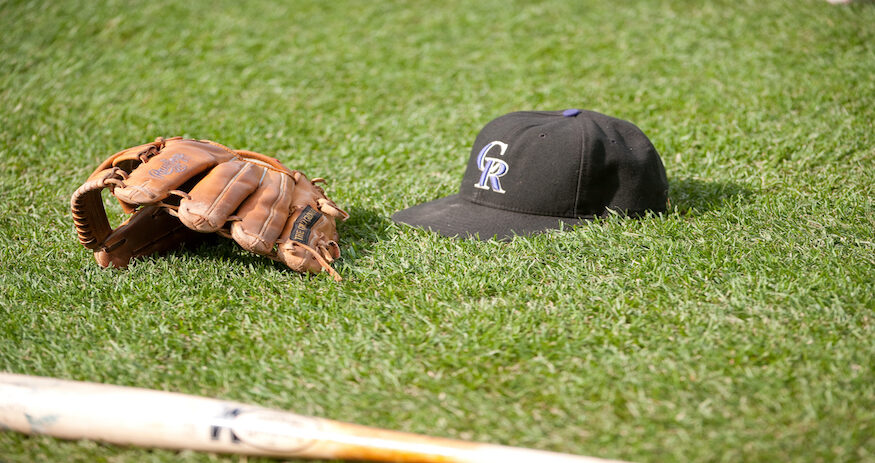Navigating the New Economics of Baseball: Inside The Colorado Rockies’ Most Strategic Play Yet
A shifting revenue mix puts a new twist on an old formula.
Stewart Schley //April 15, 2024//


Navigating the New Economics of Baseball: Inside The Colorado Rockies’ Most Strategic Play Yet
A shifting revenue mix puts a new twist on an old formula.
Stewart Schley //April 15, 2024//
“Tinkers-to-Evers-to-Chance” is the rhythmic phrase describing the legendary double-play troika presented by three Chicago Cubs infielders during the early 1900s.
The players — shortstop Joe Tinker, second baseman Johhny Evers and first baseman Frank Chance — so reliably broke the hearts of opposing teams by dispatching groundballs that the poet Franklin Pierce Adams memorialized their work in a 1910 poem.
In “Baseball’s Sad Lexicon,” Adams told the tale from the vantage point of a fatigued New York Giants fan as he lamented the ruthless predictability of this infield trio.
That was then. But 124 years later, we’re blithely updating the phrase to describe a new formula underlying the modern business of baseball. We’ll call ours “Tickets to Airwaves to Chance.”
READ: Working in Colorado’s Professional Sports Industry is Not as Glamorous as You Think
Clever, huh?
As in: Three key economic pillars that support the ability of baseball stewards like Charlie Monfort, the owner and general partner of the Colorado Rockies, to pay their bills and, ideally at least, make some money.
Tickets
The “tickets” part is what it has always been: revenue flowing from the rental of ballpark seats, along with spillover spending from live attendees on munchies and merchandise. The latest estimate from magazine publisher Forbes (for the 2022 season) is that the Rockies took in $75 million in gate receipts, representing just over one-fourth of the team’s $286 million in total revenue.
The ”tickets” part is vital given the deterioration of a second contributor to baseball’s coffers: airwaves.
Airwaves
For the past two decades or so, teams like the Rockies have been blessed by large sums of money paid by regional sports networks (RSNs) — a once-thriving component of what had been a lucrative pay TV ecosystem. Per Forbes, 2022 RSN rights payments to the Rockies amounted to $57 million.
READ: Altitude Vs. Comcast — The Changing Economy of Sports Media
Now, the RSN kingdom is a withering vestige of what it used to be.
Erosion of traditional pay TV subscriptions has cut these sports networks down to their knees. Pay TV used to present a reliable money stream — basically everybody with a cable or satellite TV subscription kicked in money for sports networks, regardless of whether they wanted to. Now, the RSN category is on life support as millions of Americans cut the pay TV cord, and in doing so, choke off a good share of the money flowing to RSNs.
The tea leaves lately have read so dour that some RSN operators, including longtime area provider AT&T SportsNet Rocky Mountain, have called it quits altogether.
Worry not, Rockies fans: The mothership MLB organization reportedly has been plotting to take over the task of producing and distributing Rockies games this season. But that’s a stopgap.
Over time a new video model is likely to arrive, whereby teams and their media partners put together a mix of old-school pay TV distribution coupled with newfangled streaming packages and arrangements to televise some games the old-fashioned way: via free, over-theair TV.
Right now, however, this is all a work in progress. And it’s this exact same uncertainty over baseball-media economics that leads us to the “Chance” part of our expression.
Chance
Here, the term refers not to Franklin Leroy Chance, the Chicago Cubs infielder whose professional career began in 1898, but to a red-hot sports gambling category. Legalized betting and the fervor surrounding it is seen by many sports industry figures as a salvation for a deteriorating media environment.
To be sure, teams like the Rockies don’t directly benefit from the large sums wagered by sports bettors. (Last July, for example, Coloradans bet close to $105 million on baseball, per the Colorado Department of Revenue, with winners pocketing $98 million in payouts.)
The Rockies don’t operate a casino in Black Hawk or accept bets from the Will Call window. Rather, the proceeds go mainly to sports books like FanDuel and BetMGM Sportsbook, which rake in the bets, dole back winnings, keep some of the spoils, and pay taxes to state governments.
READ: Live from Colorado — The Future of Sports Betting
But teams benefit in other ways.
For one thing, sportsbooks spend hundreds of millions of dollars on advertising and sponsorships, with a good share going to media partners and TV networks that, in turn, pay teams to license their games. Separately, interest stirred up by betting opportunities further bonds fans to teams and games, contributing to TV viewership, ticket sales, player merchandise, and edge-of-the-seat interest for those wagering whether Rockies shortstop Ezequiel Tovar will ground out during his final at-bat.
There are direct partnerships, too, like the sponsorship alliance the Rockies struck last August with the sports betting company bet365.
The point being: The new mix of economics, and the entrance of gambling as a revenue generator, isn’t happening in a vacuum.
If baseball owners weren’t worried about long-term attendance trends, shifting demographics and the decay of an old-school pay TV model, I’m not sure legalized gambling would cast quite the same spell. But conditions change, and so do business models.
As Rockies President and Chief Operating Officer Greg Feasel told a Colorado Business Roundtable audience recently, “You survive by adapting.”
The new rules of the sports-business road demand just that. It’s like the Chicago Cubs double-play formula of old: A shifting interplay of “tickets, airwaves and chance” represents a new twist on an old ambition: how to get your team out of a jam when trouble’s brewing.
t
























